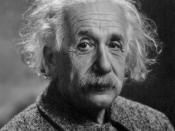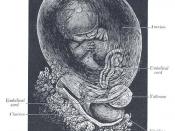Human Personhood Begins at Conception
Peter Kreeft, Ph. D, is a professor of philosophy at Boston College and at the
King's College, in New York City. He is a regular contributor to several Christian
publications; he speaks at conferences, and is the author of over 75 books. In this article,
Peter Kreeft explains one of the most important arguments in the pro-life debate, whether
or not human personhood begins at conception. This is a huge issue because some people
want to justify abortion. Abortion is the deliberate termination of a human pregnancy,
otherwise known as murder. "Abortion is clear-cut evil," and he states that anyone who
seeks peace or goodness will see this. This is very clear for Christians as their faith
enforces that every human being is sacred because he or she is made in the image of God.
Peter Kreeft argues the personhood of the fetus, which is crucial for abortion; abortion is
crucial for medical ethics; and medical ethics is crucial for the future of our civilization.
Kreeft's first argument is whether the fetus is human. Obviously the fetus is human, a
distinct member of the species Homo sapiens. This statement follows the theory of
biogenesis. Biogenesis states that if a spider lays eggs, it will become baby spiders, not
baby ants. If both of the fetus' biological parents are human, then in turn, the fetus must
be human. In turn, if the fetus is not a human person, it is okay to kill it, but since we
believe that it is a human, we know that this is an act of sin. Secondly, he argues whether
the fetus is living or not. If the fetus is not living, then in turn it can have no rights. For
Dias �3
example, corpses have no rights,


